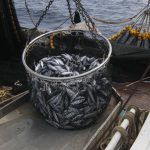It is true that organic label is divisive than any other available labels for seafood products. Some US environmental groups have called on the government to set organic standards for aquaculture. According to them the booming organic market, with its higher premium, would motivate fish farms to clean up their acts. Others remain unconvinced that an organic fish market could address aquaculture’s environmental concerns without ruining the credibility of the U.S. Department of Agriculture (USDA) organic label.
But there is uncertainty about the specifics how marine fish species can be certified as organic. Once the aquaculture was considered the safe alternative to a seafood industry that has driven global fish species toward extinction but now fish farms are labeled by some environmentalists as a more destructive option.
The USDA National Organic Standards Board is struggling over the first step in the organic fish process: what would these fish eat? A panel of aquaculture experts suggested that fish caught in the wild should be permitted to eat fishmeal in “organic” aquacultures, and over time more fishmeal would have to be farm-raised. Any environmental organizations have protested the proposal, which they said would violate organic rules that require organic animals to be fed organic food. They also said that it may threaten the survival of smaller fish, which are disappearing as they are caught to feed carnivorous farmed fish, such as salmon or trout.
Rebecca Goldburg, an EDF senior scientist, told that organic products have a price premium, people are willing, producers are willing, to try new things. She said that it is not going to transform a whole sector, but it’s a good way to pioneer techniques. You can’t do that unless if you create incentive for people to pursue them.








